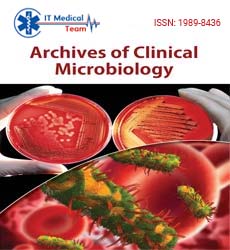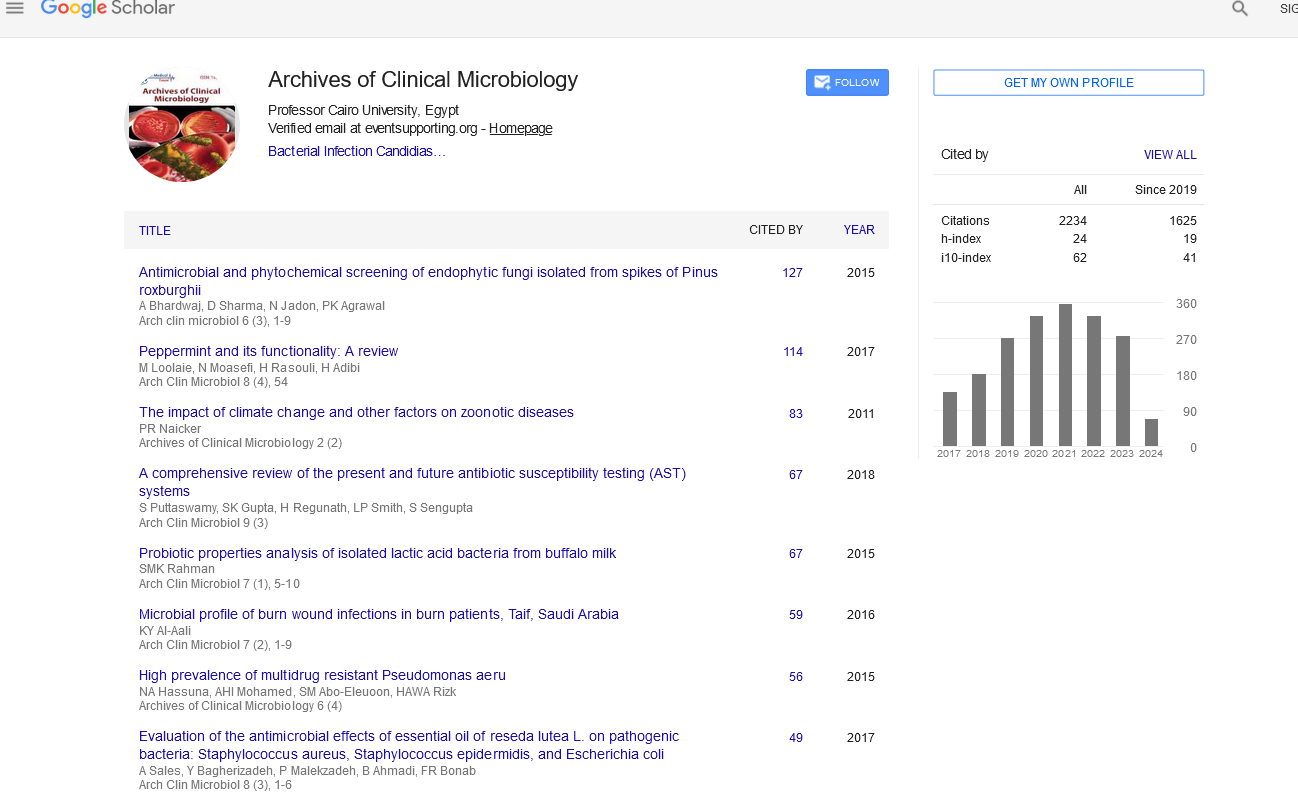Perspective - (2024) Volume 15, Issue 5
Impact of COVID-19 on Clinical Microbiology Practices
Indumathi Venkatachalam*
Department of Microbiology and Immunology, National University of Singapore, Queenstown, Singapore
*Correspondence:
Indumathi Venkatachalam, Department of Microbiology and Immunology, National University of Singapore, Queenstown,
Singapore,
Email:
Received: 09-Sep-2024, Manuscript No. IPACM-24-14960;
Editor assigned: 12-Sep-2024, Pre QC No. IPACM-24-14960 (PQ);
Reviewed: 26-Sep-2024, QC No. IPACM-24-14960;
Revised: 07-Oct-2024, Manuscript No. IPACM-24-14960 (R);
Published:
14-Oct-2024
Introduction
The emergence of the novel Coronavirus Disease 2019
(COVID-19), caused by the Severe Acute Respiratory Syndrome
Coronavirus 2 (SARS-CoV-2), has had profound implications for
clinical microbiology practices worldwide. This article explores
the multifaceted impacts of COVID-19 on clinical microbiology,
including changes in diagnostic testing, laboratory operations,
infection control measures, and the broader healthcare landscape.
The COVID-19 pandemic, declared by the World Health
Organization (WHO) in March 2020, has challenged healthcare
systems globally, necessitating rapid adaptations and
innovations in clinical microbiology practices. As the primary
diagnostic discipline responsible for identifying infectious
diseases, clinical microbiology has played a pivotal role in the
pandemic response, from testing for SARS-CoV-2 to managing
co-infections and antimicrobial resistance. This article examines
how COVID-19 has reshaped clinical microbiology practices and
identifies key lessons learned for future infectious disease
outbreaks.
Description
Changes in diagnostic testing
One of the most immediate impacts of COVID-19 on clinical
microbiology has been the surge in diagnostic testing for SARS-CoV-2. Laboratories worldwide quickly scaled up their testing
capacity to meet the unprecedented demand for COVID-19
diagnostics, utilizing techniques such as real-time Reverse
Transcription Polymerase Chain Reaction (RT-PCR) to detect viral
RNA in respiratory samples. The rapid development and
deployment of molecular assays have been crucial in identifying
and isolating infected individuals, thereby mitigating the spread
of the virus.
In addition to molecular testing, serological assays have been
employed to detect antibodies against SARS-CoV-2, providing
insights into population level immunity and informing public
health strategies. The integration of rapid antigen tests has
facilitated point of care testing and enhanced screening efforts
in high-risk settings, such as healthcare facilities and congregate
settings.
The experience gained from implementing COVID-19 testing
strategies has underscored the importance of flexibility and
scalability in diagnostic testing platforms. Laboratories have
embraced automation and digitalization to streamline workflows
and increase testing throughput, ensuring timely results for
patient management and public health decision-making.
Impact on laboratory operations
COVID-19 has significantly impacted laboratory operations,
presenting logistical challenges and resource constraints.
Laboratories have faced shortages of critical supplies, including
Personal Protective Equipment (PPE), viral transport media, and
reagents essential for diagnostic testing. Supply chain disruptions
and global demand surges have necessitated strategic resource
allocation and collaboration among healthcare institutions and
industry partners.
To mitigate operational disruptions, laboratories have
implemented contingency plans and diversified their supply
chains to enhance resilience against future supply chain
disruptions. The pandemic has highlighted the need for robust
inventory management systems and disaster preparedness
protocols to maintain continuity of diagnostic services during
emergencies.
Furthermore, COVID-19 has accelerated the adoption of digital
pathology and telemedicine solutions, enabling remote
consultation and collaboration among healthcare professionals.
Virtual platforms have facilitated interdisciplinary communication
and education, fostering knowledge exchange and best practice
dissemination in clinical microbiology.
Challenges in infection control
Infection control practices have been paramount in mitigating
the transmission of SARS-CoV-2 within healthcare settings.
Clinical microbiologists have collaborated with infection
prevention and control teams to implement stringent protocols
for specimen handling, biosafety measures, and environmental
disinfection. The implementation of standardized protocols, such as specimen collection guidelines and PPE recommendations,
has been crucial in protecting laboratory personnel and
minimizing the risk of nosocomial transmission.
The pandemic has underscored the importance of surveillance
and outbreak response capabilities in clinical microbiology.
Laboratories have enhanced their surveillance systems to
monitor COVID-19 epidemiology trends, detect emerging
variants of concern, and assess the impact of public health
interventions. Real-time data sharing and collaboration with
public health authorities have facilitated evidence-based
decision-making and coordinated response efforts across local,
national, and global levels.
Impact on antimicrobial stewardship
The intersection of COVID-19 and antimicrobial stewardship
has posed unique challenges and opportunities for clinical
microbiology. The overuse and misuse of antibiotics during the
pandemic, driven by concerns about bacterial co-infections and
secondary infections, have heightened the risk of antimicrobial
resistance. Clinical microbiologists have played a critical role in
promoting judicious antibiotic use through diagnostic
stewardship initiatives and the implementation of rapid
diagnostic tests to differentiate bacterial from viral infections.
The pandemic has underscored the importance of
multidisciplinary collaboration and education in antimicrobial
stewardship. Clinical microbiologists have engaged with infectious
disease specialists, pharmacists, and healthcare providers to
develop evidence-based guidelines for antibiotic prescribing and
treatment protocols. Education campaigns targeting healthcare
professionals and the general public have emphasized the
principles of antimicrobial stewardship and the importance of
preserving antibiotic effectiveness for future generations.
Lessons learned and future directions
The COVID-19 pandemic has served as a catalyst for
innovation and resilience in clinical microbiology practices.
Laboratories have embraced digital transformation, automation,
and data-driven decision-making to enhance diagnostic
capabilities and operational efficiency. The pandemic response
has highlighted the need for sustainable investments in
laboratory infrastructure, workforce training, and pandemic
preparedness to strengthen healthcare resilience against future
infectious disease threats.
Looking ahead, the integration of genomic sequencing and
bioinformatics in clinical microbiology promises to revolutionize
infectious disease surveillance and outbreak investigation.
Advanced molecular techniques can provide insights into
pathogen evolution, transmission dynamics, and resistance
mechanisms, guiding targeted public health interventions and
therapeutic strategies.
Global collaboration and information sharing remain essential
in combating infectious diseases on a global scale. The COVID-19
pandemic has underscored the importance of solidarity,
scientific cooperation, and equitable access to diagnostics and
treatments. By leveraging lessons learned from COVID-19,
clinical microbiology is poised to advance its role in infectious
disease management, pandemic preparedness, and global
health security.
Conclusion
The impact of COVID-19 on clinical microbiology practices has
been far-reaching, reshaping diagnostic testing, laboratory
operations, infection control measures, and antimicrobial
stewardship. The pandemic has accelerated innovation, digital
transformation, and collaboration within the clinical
microbiology community, paving the way for enhanced resilience
and preparedness in the face of future infectious disease
outbreaks. By embracing lessons learned from COVID-19, clinical
microbiology is poised to leverage technological advancements
and interdisciplinary collaboration to safeguard public health and
improve patient outcomes worldwide.
Citation: Venkatachalam I (2024) Impact of COVID-19 on Clinical Microbiology Practices. Arch Clin Microbiol Vol:15 No:5





